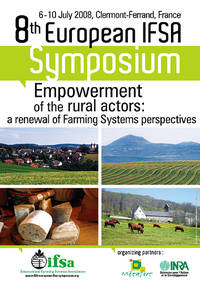
Empowerment of the rural actors: A renewal of the farming systems perspective

The Proceedings of the 8th European IFSA Symposium (held in Clermont Ferrand, France) were edited by Benoit Dedieu and Sylvie Zasser-Bedoya and published in 2008 by INRA SAD (ISBN 978-2-7380-1252-4), 1016 pp.
Selected papers from various workshops were published in 2009 in Special Issues of following Journals:
Outlook on Agriculture 38(2)
Journal of Agricultural Education and Extension 15(2)
You can download the full proceedings from the Symposium website
Clicking on the Workshops below will allow you to download individual papers.
Workshop 1: Learning, collective action and empowerment for rural reorganisation. The Convenors were: Patrick Steyaert, Egon Noe and Marc Paine. Collaborative approaches to rural change appreciate multiple stakeholders' views of the future, and empower co-development for this future. These approaches are underpinned by 'learning processes'. Practically, we question how learning addresses scaling up issues - effective collaboration at a local level often lacks a corresponding change in organisations and policies. Theoretically, we ask what the appropriate knowledge perspectives are in this context.
Workshop 2: Vertical integration: Farming systems in the food chain. The Convenors were: Francois Casabianca and Karel de Greef. This workshop discussed research-based experiences of the changed conditions that farming systems face within the whole food chain. Therefore it will focus on the environmental, social and economic impacts of different food chains and the challenges and opportunities offered by diverse quality schemes and standard setting organisation at the world level, as well as the certification tools implemented. The ability of diverse farm systems to enter into those schemes has to be addressed, as well as the possibilities that exist for different farm types to be proactive and competitive.
Workshop 3: Adaptive farming systems. The Convenors were: Stéphane Bellon, Ika Darnhofer, Benoit Dedieu and Rebecka Milestad. The rapid pace of change and its often unforeseeable direction require farmers to keep their farms flexible and adaptive. This workshop will focus on exploring the attitudes, structures and activities that build and sustain the ability of farmers and farming communities to cope with on-going change and to use the opportunities offered by change. In particular, we will examine the factors that support the capacity of farming systems to create, test and maintain an adaptive design.
Workshop 4: Landscape as a frame for - and a product of - development in rural areas. The Convenors were: Derk Jan Stobbelaar, Livia Madureira and Jacques Baudry. Landscapes have always had a dual role in the rural areas: on the one hand they provide a frame and resource for production functions and on the other hand they are a product of these functions. Because in the rural areas in (western) Europe a shift can be seen from mono-production functions to societal multi-functions, this dual dynamic of landscapes will change. Landscape is more and more used as resource and as a flexible frame for rural development. The main goal of this workshop was to open the debate to representations, models, participatory approaches and other tools that address the changing roles of landscape and its impacts at farm and regional scales. Other important issues in the context of this debate was to compare Eastern and Western European countries and to discuss the role of planning and education to deal with landscape changes.
Workshop 5: GHG emission reduction and energy production in agriculture, forestry, aquaculture and mariculture: potentials and impacts. The Convenors were: Hans Langeveld, Catherine Macombe, Rym Ben Zid and Willem Brandenburg. Europe is facing important challenges, including Global Warming or Climate Change. Agricultural, forest and aquatic production systems (sea and coastal zone systems included) play an important roe in both the cause and the solution of this problem. The problem is not calling for a revolutionary shift, nor for one-way solutions but, instead, for a mosaic of good practices and ideas. The workshop discussed added-value or competitive advantages from production systems to produce energy and/or to reduce GHG emissions.
Workshop 6: Change in knowledge systems and extension services - Role of new actors. The Convenors were: Michael Kügler, Artur Cristovao and Anne Mette Sorensen-Langvad. This workshop deals with the management of change in know-how production, exchange and use, considering the miltiple and often complex relationships between scientists, extension agents and rural actors. There are very different approaches of extension in different countries, as well as a broad variety of players in the field. Structuring catching up processes in developing farming systems by extension services have to be re-discussed under the new conditions of globalisation, climate change, energy stress and reduced public impact.
Satellite Session: Education in landscape and territory agronomy. The session was co-chaired by Camilla Moonen and Sylvie Lardon. Landscape agronomy analyses the two-way relationship between farming practices and landscapes: practices build landscapes and are determined by landscapes. It is a participatory action science that aims to provide indications for action (development projects at the territory level). The satellite session develops comparative analyses regarding research and training experiences in Europe dealing with questions on change in agriculture, related to landscape dynamics and environmental demands.
